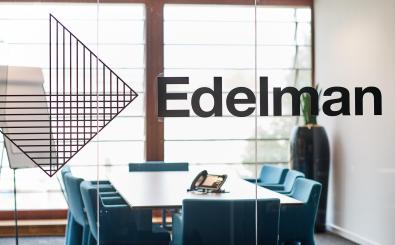What do Germany in 2021 and Siena in the late Middle Ages have in common? At first glance, very little. However, then as now, there was cause to reflect on the role companies have in state and society.
In the Peace Hall in Siena, an almost naked angelic figure hovers above craftsmen, merchants, and peasants. It is Ambrogio Lorenzetti's marvelous allegorical frescoe on the effects of Good and Bad Government in Town and Country, and the floating figure is Securitas (painted between 1337 and 1339). The message the angel carries is as relevant today as it was some 700 years ago: Businesses have a political responsibility.
As the Edelman Trust Barometer Spring Update shows, most Germans think the same way in 2021. According to the study, 53 percent of respondents are convinced that the consequences of the Covid 19 pandemic can only be overcome if companies become more involved in society. 64 percent of all employees expect their company to be actively involved in increasing vaccinations, climate protection, and standing against racism — and these are just the top three topics in the list of political responsibilities for managers.

The banner of Lorenzetti's Securitas reads as follows:
Let every man go about without fear, and let every man sow, while this lady rules the land, for she has taken the power from all the guilty.
The "lady" the angel refers to is the Lady Justice on the front wall of the council hall. In his work, Lorenzetti expresses that the preservation of a stable society and safe living conditions is a task of the community and all those who live, move freely, and do business within it. Incidentally, this is also stated in Article 14 of the German Basic Law: "Property is an obligation. Its use shall at the same time serve the common good."
The political self-image of Italian merchants during the Renaissance, which Lorenzetti anticipates in the Palazzo Pubblico, emerged in an early heyday of international trade in goods. One might say it emerged in the wake of the first wave of globalization. But above all, it arose out of the need to protect the foundation of its own prosperity from the effects of bad government or, indeed, from the effects of pandemics. In 1348, around two-thirds of the population of Siena died of the plague. Despite our own experience of pandemics in the modern world, we can only guess at the effort it took to maintain something like a community, justice, and hope during one in the 14th century.
But let’s return to the challenges of the present. Compared with the Edelman Trust Barometer 2021, which was published in January, the Spring Update shows that: the government, with 55% (-4 % points.; globally: 56%, +1 % point.), and companies, with 54% (+/-0 % points.; globally: 62%, +2 % points.), were unable to gain further trust among Germans in the spring. Looking to the future, just under half of the respondents in Germany (51%; globally: 64%) say that — as bad as the pandemic is — the crisis will lead to important innovations and changes for the better.

These numbers show that the crisis is not over yet. In a continuing period of uncertainty, those in positions of responsibility in politics, business, and the media must seize the opportunity to respond to people's needs and concerns. People in Germany currently place the greatest trust in their firms’ managers as well as scientists. However, politicians, church representatives, and journalists tend not to be trusted. The pressure of expectations toward one's employer is therefore increasing significantly. Companies, and especially their CEOs, must face up to this "naked truth": Those who benefit from the advantages of good government and a stable society must continuously and actively ensure that they are maintained.

© Ambrogio Lorenzetti: The Effects of Good Government in the Countryside (detail) - Wikimedia Commons
With the figure of his almost naked angel, Lorenzetti created an effective eye-catcher for his call for political co-responsibility of the entrepreneurs of his time. The allegorical figure of the unveiled Securitas also refers to the exposure that accompanies every political and social statement. Companies, corporate leaders, and brands that take a public stand and step into the spotlight expose themselves, leave their comfort zone and make themselves vulnerable. And yet, corporate commitment to political and social issues of the future is still highly pertinent today.
But how exactly? On which topics can and should a company, a brand, or a CEO get actively involved? And on which issues is it better not to? There can only be individual answers to these questions, but unlike 700 years ago, such decisions can now be made on the basis of data. Edelman's decades of trust research and Edelman Trust Management provide the foundation for the kind of responsible, strategic and socially relevant corporate communications that are expected of companies in the 21st century.
If you are interested in exchanging ideas with us, please feel free to get in touch.

